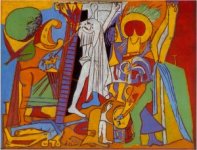noci
Established
Morca007 said:I am currently writing my term paper in my Existentialism class on photography, so I figured I would post some of those ideas here.
-Photography is an art dependant upon "the other," in that all of the tools required to practice it are made by others. Even the film we use is produced by others, which determines the look of our output. Does this mean that photography cannot be considered authentic?
[...]
-Indeed, in any photography save for studio work of still life, where the photographer is in control of everything, is the photographer ever truly responsible for the entirety of their output?
Just a few things to ponder... 😉
I don't know what you mean by "authentic" at all. whether your first statement works or not hinges on what you yourself define as authentic, and It'd be a legit strategy to limit yourself to proving a narrowed-down point. researching authenticity would also be a logical starting point.
Furthermore, the sole fact that someone else produces your film, paint, sensor or whatever does not determine the final look of your images.
i.e. all the stuff in my own gallery was shot with consumer gear, though it doesn't look like it. on the contrary, the images exploit technical and formal loopholes explicitly inserted into the canonical idea of how a photograph ought to look and feel. It is via these implicit breaking points that a sense of stability is produced. Heidegger realized this in his discussion of metaphysics and metaphor as related to architecture: the foundations are unstable, and this instability is a fuel.
As you can probably infer from my lines I am also deeply influenced by Derrida, though not because of a masturbatory lust, but because my discovering of his work clarified a lot of my own explorations after the fact.
yet, photography is metaphysics: it, like other arts, posits a reality that albeit it is related to a "realist/positivist" assumption of reality still delineates its own system.
What others in this discussion highlighted as contextualism is an important point: the assumed distance to the "others" moves them infinately closer; the known suddenly becomes "uncanny" as famously described by Freud in his discussion of the domestic.
In this sense, Existentialism is alienation from [ ]. If I were pressed to search for it in my own work,
[and I'm really sorry if I'm shamelessly plugging myself here (but this topic touches a raw nerve with me..)]
it is right there, as an absence, in the middle of it all, invisible.
sorry for the convoluted post - it was a long day.
max

